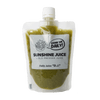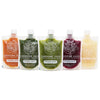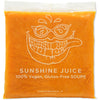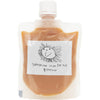"I want to use vegetables filled with the producer's thoughts."

At Sunshine juice, we would like to talk directly with farmers and producers and use fresh and thoughtful vegetables and fruits as ingredients for juice.
Also, since the store opened, we have been actively using products that are not on the market simply because they are "bad in shape" or "not uniform."
This time, I would like to introduce the vegetables and fruits that I actually used with the producers I talked to recently.
Kanagawa Hayama Bassed Farm Lee's celery

Lee-kun's vegetables, which are pesticide-free, chemical fertilizer-free, and naturally grown vegetables, are as pure and powerful as the person himself. Especially celery is not celery to know!
Two types of juice, celery juice and I am WATER (celery and seasonal citrus juice), were very popular this year as a seasonal menu item.
★Hiroshima Morisaki Farm Mr. Morisaki's "Kinari Ripe Hassaku"

Hassaku, Amanatsu, and Dekopon, which are usually harvested around February , have hard-skinned citrus fruits, such as Hassaku, Amanatsu , and Dekopon, which have acidity remaining immediately after harvesting. It is said that 'Tree Nari Ripe Hassaku' was on the tree until just before shipping. I was really looking forward to the arrival because I heard that "the sweetness is exceptional!"
From Morisaki-san.
"It's the first time I've eaten them right after they've been harvested, as they don't grow on trees until this time, but I was surprised at how delicious they were! They don't look good from the outside, but the contents are perfect!!"
At the Ebisu store, there are several types of juice that use seasonal citrus fruit throughout the year, and we hope you will enjoy the fact that the taste changes depending on the type of citrus fruit.
Kochi Ueta Lab. Mr. Ueda's carrots

At the new moon juice club , a community that conducts a juice cleanse every month on the day of the new moon, we deliver two 1L bottles of juice once a month. We used plenty of carrots grown with organic fertilizer made by Mr. Ueda .
The carrot that felt the energy of the soil was sweet and had a strong taste.
Below is a comment from Mr. Ueda.
“I love outdoor sports, the natural environment, and agriculture, and I am currently reclaiming abandoned farmland and using my own brand of microorganisms to develop farming that is close to nature. When I told my son about it, he would bite into the carrots from the field with dirt!”
Kyoto Oharano Yamanobe's kale

``I was skeptical about disposing of the leftover vegetables, which are cut off or avoided for shipping, so I decided to mix them with the soil.'' I used kale for green juice at the Ebisu store.
The kale from the farm, which was made by composting the leftover vegetables, changed the soil and became fluffy without weeds growing.
I was also planning to grow other vegetables, so I'm looking forward to it.
Chiba Isumi City Organic Horse Farm Chofuku-san's Komatsuna "Hakkei"

“Rather than planting crops many times a year to increase the yield, I would like to do farming in a way that does not overuse the farmland by keeping the soil environment as healthy as possible.” Fuku-san's organic komatsuna "Hakkei" was used in green juice at the Ebisu store in April .
The green juice made with Japanese mustard spinach, which has a surprising dark green color, thick and solid petioles, and a volume that conveys the atmosphere of "healthy!" The image of nutrition permeating the body spreads.
Thank you all.
I would like to continue to talk directly with vegetable producers all over Japan to create juicy products that share my thoughts on growing vegetables and soil.


 Special
Special
 Subscription
Subscription
 Cleanse
Cleanse
 Juice
Juice
 Shizen Remedy
Shizen Remedy
 Soup / Curry
Soup / Curry
 Snack
Snack

 Detox
Detox
 Fatigue recovery
Fatigue recovery
 Beautiful skin
Beautiful skin
 Intestinal beautification
Intestinal beautification
 Relax
Relax
 Performance up
Performance up
 Hormone balance
Hormone balance
 cold relief
cold relief


